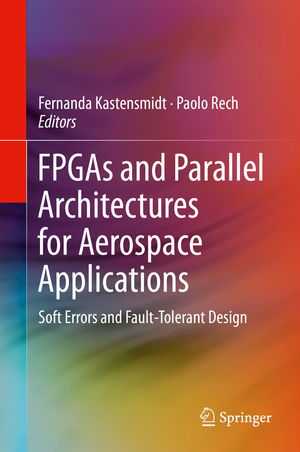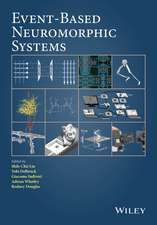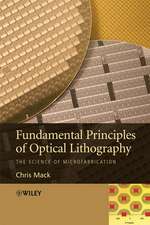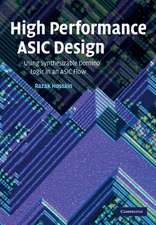FPGAs and Parallel Architectures for Aerospace Applications: Soft Errors and Fault-Tolerant Design
Editat de Fernanda Kastensmidt, Paolo Rechen Limba Engleză Hardback – 15 dec 2015
| Toate formatele și edițiile | Preț | Express |
|---|---|---|
| Paperback (1) | 504.11 lei 38-44 zile | |
| Springer International Publishing – 27 mar 2019 | 504.11 lei 38-44 zile | |
| Hardback (1) | 697.98 lei 38-44 zile | |
| Springer International Publishing – 15 dec 2015 | 697.98 lei 38-44 zile |
Preț: 697.98 lei
Preț vechi: 906.47 lei
-23% Nou
Puncte Express: 1047
Preț estimativ în valută:
133.55€ • 139.44$ • 110.54£
133.55€ • 139.44$ • 110.54£
Carte tipărită la comandă
Livrare economică 01-07 aprilie
Preluare comenzi: 021 569.72.76
Specificații
ISBN-13: 9783319143514
ISBN-10: 3319143514
Pagini: 300
Ilustrații: VII, 325 p. 149 illus., 81 illus. in color.
Dimensiuni: 155 x 235 x 19 mm
Greutate: 0.79 kg
Ediția:1st ed. 2016
Editura: Springer International Publishing
Colecția Springer
Locul publicării:Cham, Switzerland
ISBN-10: 3319143514
Pagini: 300
Ilustrații: VII, 325 p. 149 illus., 81 illus. in color.
Dimensiuni: 155 x 235 x 19 mm
Greutate: 0.79 kg
Ediția:1st ed. 2016
Editura: Springer International Publishing
Colecția Springer
Locul publicării:Cham, Switzerland
Public țintă
Professional/practitionerCuprins
Programmable Logic and Parallel Architectures for Space Applications.- Applications.- Brazilian Nano-satellite with Reconfigurable SOC GNSS Receiver Tracking capability.- Overview and Investigation of SEU Detection and Recovery Approaches for FPGA-based Heterogeneous Systems.- SRAM-based FPGAs.- A Fault injection technique oriented to SRAM-FPGAs.- Fault Injection System for Measuring Soft Processor Design Sensitivity on Virtex-5 FPGAs.- Hybrid Configuration Scrubbing for Xilinx Series-7 FPGAs.- N-MR Techniques for SRAM-based FPGAs and Power Analysis.- Fault-Tolerant Manager Core for Dynamic Partial Reconfiguration in FPGAs.- Multiple Fault Injection FPGA Platform based on Ground-level Radiation Experiments.
Notă biografică
Fernanda Lima Kastensmidt joined the Instituto de Informática faculty in 2005. She received a PhD in 2003 and MSE in 1999 both in Computer Science from Universidade Federal do Rio Grande do Sul (UFRGS) in Porto Alegre, RS, Brazil. Dr. Fernanda’s current research focuses on soft error mitigation techniques for SRAM-based FPGAs and integrated circuits, such as microprocessors, memories and network-on-chips (NoCs), and the analysis and modeling of radiation effects in those circuits. Paolo Rech is an Adjunct Professor for the Instituto de Informática.
Textul de pe ultima copertă
This book introduces the concepts of soft errors in FPGAs, as well as the motivation for using commercial, off-the-shelf (COTS) FPGAs in mission-critical and remote applications, such as aerospace. The authors describe the effects of radiation in FPGAs, present a large set of soft-error mitigation techniques that can be applied in these circuits, as well as methods for qualifying these circuits under radiation. Coverage includes radiation effects in FPGAs, fault-tolerant techniques for FPGAs, use of COTS FPGAs in aerospace applications, experimental data of FPGAs under radiation, FPGA embedded processors under radiation, and fault injection in FPGAs. Since dedicated parallel processing architectures such as GPUs have become more desirable in aerospace applications due to high computational power, GPU analysis under radiation is also discussed.
· Discusses features and drawbacks of reconfigurability methods for FPGAs, focused on aerospace applications;
· Explains how radiation from space causes soft errors in FPGAs and how to mitigate them;
· Enables readers to qualify the target application on FPGA under radiation and by fault injection.
· Discusses features and drawbacks of reconfigurability methods for FPGAs, focused on aerospace applications;
· Explains how radiation from space causes soft errors in FPGAs and how to mitigate them;
· Enables readers to qualify the target application on FPGA under radiation and by fault injection.
Caracteristici
Discusses features and drawbacks of reconfigurability methods for FPGAs, focused on aerospace applications Explains how radiation from space causes soft errors in FPGAs and how to mitigate them Enables readers to qualify the target application on FPGA under radiation and by fault injection











